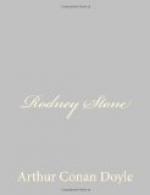“And play-actresses also, Roddy. And you will not cast your underclothing until June is in. Young Master Overton came by his death through it. Think well of your dress, Roddy, so as to do your uncle credit, for it is the thing for which he is himself most famed. You have but to do what he will direct. But if there is a time when you are not meeting grand people, you can wear out your country things, for your brown coat is as good as new, and the blue one, if it were ironed and relined, would take you through the summer. I have put out your Sunday clothes with the nankeen vest, since you are to see the Prince to-morrow, and you will wear your brown silk stockings and buckle shoes. Be guarded in crossing the London streets, for I am told that the hackney coaches are past all imagining. Fold your clothes when you go to bed, Roddy, and do not forget your evening prayers, for, oh, my dear boy, the days of temptation are at hand, when I will no longer be with you to help you.”
So with advice and guidance both for this world and the next did my mother, with her soft, warm arms around me, prepare me for the great step which lay before me.
My uncle did not appear at breakfast in the morning, but Ambrose brewed him a dish of chocolate and took it to his room. When at last, about midday, he did descend, he was so fine with his curled hair, his shining teeth, his quizzing glass, his snow-white ruffles, and his laughing eyes, that I could not take my gaze from him.
“Well, nephew,” he cried, “what do you think of the prospect of coming to town with me?”
“I thank you, sir, for the kind interest which you take in me,” said I.
“But you must be a credit to me. My nephew must be of the best if he is to be in keeping with the rest of me.”
“You’ll find him a chip of good wood, sir,” said my father.
“We must make him a polished chip before we have done with him. Your aim, my dear nephew, must always be to be in bon ton. It is not a case of wealth, you understand. Mere riches cannot do it. Golden Price has forty thousand a year, but his clothes are disastrous. I assure you that I saw him come down St. James’s Street the other day, and I was so shocked at his appearance that I had to step into Vernet’s for a glass of orange brandy. No, it is a question of natural taste, and of following the advice and example of those who are more experienced than yourself.”
“I fear, Charles, that Roddy’s wardrobe is country-made,” said my mother.
“We shall soon set that right when we get to town. We shall see what Stultz or Weston can do for him,” my uncle answered. “We must keep him quiet until he has some clothes to wear.”
This slight upon my best Sunday suit brought a flush to my mother’s cheeks, which my uncle instantly observed, for he was quick in noticing trifles.
“The clothes are very well for Friar’s Oak, sister Mary,” said he. “And yet you can understand that they might seem rococo in the Mall. If you leave him in my hands I shall see to the matter.”




